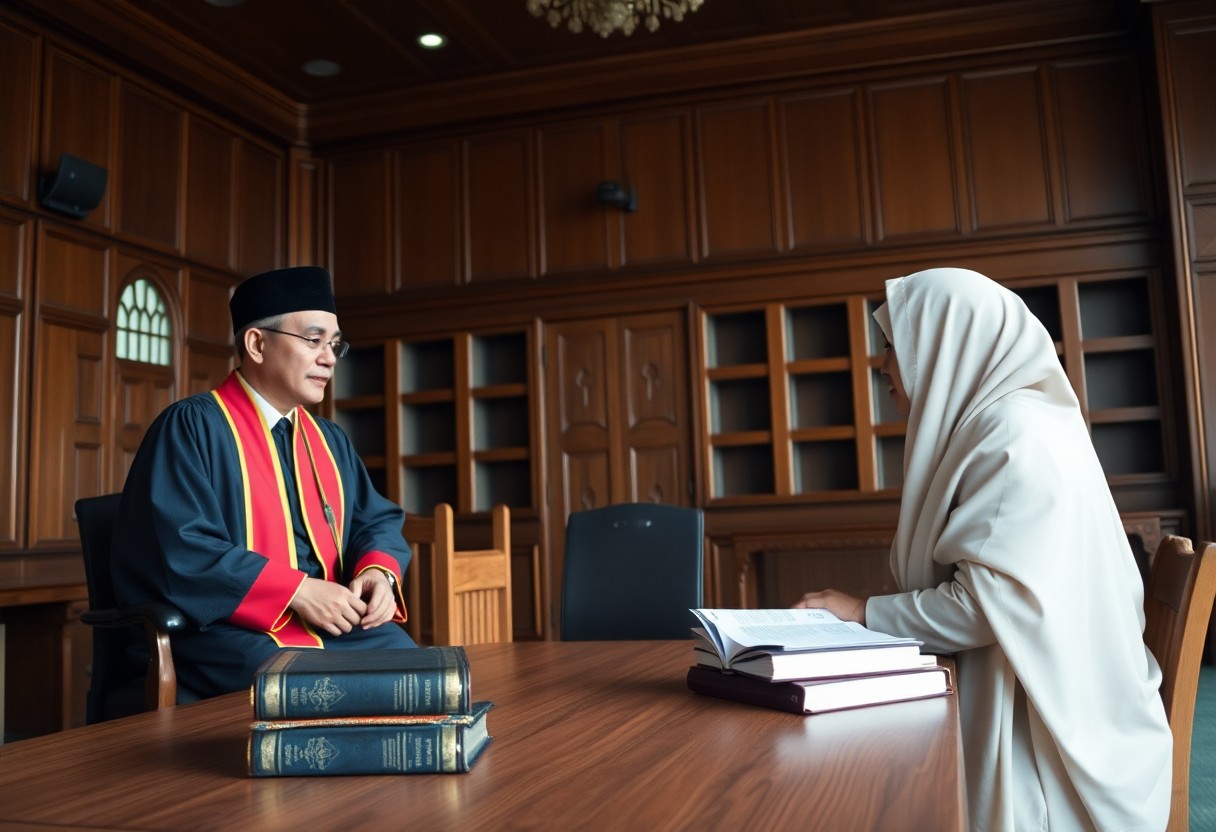Just as the journey of marriage can be complex, so can the process of divorce under Islamic law in Selangor. It is necessary for you to understand your rights and obligations during this significant life transition. This post will guide you through the legal framework governing divorce in Selangor, ensuring you are informed about issues such as child custody, financial responsibilities, and property division. With the right knowledge, you can navigate this important matter with confidence and clarity.

Key Takeaways:
- Islamic Law in Selangor governs divorce proceedings, emphasizing the importance of following prescribed religious practices.
- There are two main types of divorce in Islamic tradition: Talak (initiated by the husband) and Khula’ (initiated by the wife), each with distinct procedures.
- Both parties have rights to claim maintenance during the Iddah period, which is the waiting period after divorce.
- Custody of children post-divorce is generally awarded to the mother, but the father retains certain rights and responsibilities.
- The division of property and assets should be handled fairly, considering the contributions of both spouses during the marriage.
- Mediation is encouraged to resolve disputes amicably before proceeding to formal divorce proceedings in court.
- It is necessary for individuals seeking divorce to seek legal advice to understand their rights and fulfill their obligations under Islamic law.
Legal Framework of Divorce in Selangor
The legal framework governing divorce in Selangor is shaped by both Islamic law and state legislation. Islamic Family Law (Federal Territory) Act 1984 acts as the primary piece of legislation, outlining the rights and responsibilities of couples during divorce proceedings. This framework provides distinct pathways for married Muslims seeking dissolution of marriage, with specific provisions tailored to Islamic precepts, emphasizing mediation and reconciliation before proceeding with divorce. Understanding this framework is necessary for navigating your rights and obligations.
Islamic Personal Law and Its Implications
Under Islamic personal law, divorce is legitimized through various methods, including Talak (the husband’s declaration of divorce) and Khula (the wife’s request for divorce). Each method carries its own implications regarding alimony, child custody, and property division. With these laws, you not only protect your rights but also ensure compliance with religious tenets, which are paramount in the context of Islamic marriage dissolution.
Application of State Law in Marital Matters
In Selangor, the application of state law further complements Islamic Family Law, particularly regarding matters such as child custody and division of assets. Your marital case may be subjected to both sets of laws, which can lead to more comprehensive rulings on your specific situation. Understanding how state laws intertwine with Islamic regulations enhances your ability to navigate legal challenges effectively.
The interplay of state law within marital matters introduces more layers to the divorce process. For instance, if you are facing issues relating to financial support or child custody, both Islamic Family Law and Malaysian civil law can be invoked, ensuring that your rights are fully represented. This dual legal framework allows you to pursue claims in a manner that safeguards both your religious and civil rights, providing avenues for resolution that are in your best interest and those of your children.

Your Rights During Divorce Proceedings
As a party to divorce proceedings in Selangor, you are entitled to certain rights that aim to protect your interests and ensure a fair process. You can seek maintenance or support, division of assets acquired during the marriage, and custodianship of any children. It is necessary to understand these rights to effectively navigate the complexities of divorce while safeguarding your welfare and that of your family.
Entitlements to Maintenance and Support
During divorce proceedings, you have the right to receive maintenance and support, which can be provided by your spouse. The amount typically depends on the financial capabilities of the paying party and the needs of the receiving party. This financial assistance aims to provide you with the necessary resources to maintain your standard of living and any dependent children during and after the divorce process.
Division of Assets and Custodianship of Children
In the event of a divorce, the division of assets and custodianship of children are key considerations. Both parties are entitled to a fair share of marital assets, which may include property, savings, and investments acquired during the marriage. As for children, custody arrangements should prioritize their best interests, often leading to shared custody or visitation rights, depending on your circumstances.
Assets are divided based on their contribution to the marriage, where each party’s financial and non-financial contributions are considered. The court often performs a thorough evaluation of acquired wealth, including household items, real estate, and joint bank accounts. Custodianship focuses on the child’s emotional, mental, and physical welfare, reflecting on factors such as parenting capacity and the child’s preferences, especially if they are older. Thus, it’s vital to prepare and present evidence that supports your claim for a favorable outcome in both asset division and custodianship discussions.
Obligations and Responsibilities Post-Divorce
Post-divorce obligations require you to navigate emotional and practical changes, ensuring compliance with Islamic principles. Both parties maintain certain responsibilities that impact financial stability, child custody, and personal well-being. Understanding these obligations will aid in your transition and help preserve dignity for all involved.
Financial Responsibilities and Alimony
Following a divorce, you may have financial responsibilities that include support for your ex-spouse and children. Under Islamic law, alimony is not a mere formality; it seeks to ensure that the financially weaker partner receives adequate support based on your circumstances and the length of the marriage. This can involve both one-time payments and ongoing assistance to help maintain living standards.
Societal and Familial Aspects of Divorce
Divorce often extends its impact beyond you and your ex-spouse, influencing your families and social networks. Decisions surrounding custody and visitation can be complicated, affecting family dynamics and community relationships. Engaging positively with your extended family can foster understanding and facilitate smoother transitions, ultimately promoting a supportive environment for any children involved.
The societal impact of divorce can be profound. It doesn’t just change your immediate family structure; it reverberates through your community. Relationships with relatives may shift as perceptions change, and your kids may also face challenges in navigating friendships. To mitigate these effects, consider open communication and community involvement. Engaging in community support networks can help both you and your children heal, lessen stigma, and foster a more positive environment as you all adjust to your new reality.

The Role of Mediation and Alternative Dispute Resolution
Mediation serves as a viable alternative to court proceedings in resolving disputes during a divorce. By engaging a neutral third-party mediator, you can facilitate open dialogue and negotiation with your spouse. This approach not only promotes a collaborative atmosphere but also allows for tailored solutions that suit both parties involved, potentially reducing conflict and fostering mutual understanding.
Benefits of Mediation in Islamic Divorce
Mediation offers several advantages in Islamic divorce proceedings, including cost-effectiveness, time efficiency, and a more personalized resolution. You may find that discussions lead to amicable agreements that honor religious stipulations, while also preserving relationships that may otherwise suffer during contentious court battles.
Comparing Mediation with Court Proceedings
When placed alongside traditional court proceedings, mediation stands out for its flexibility and confidentiality. Mediation often involves less formal settings, allowing both parties to communicate openly without the fear of public scrutiny that accompanies court cases. This environment can dramatically reduce stress and lead to more satisfactory outcomes.
Comparison of Mediation and Court Proceedings
| Mediation | Court Proceedings |
| Less expensive option, reducing legal fees | Often involves higher costs due to legal representation |
| Faster resolution process | Can prolong due to scheduling and litigation complexities |
| Informal and private discussions | Publicly accessible court records and proceedings |
| Empowers parties to reach mutual agreements | Judicial decisions imposed upon parties, limiting control |
Choosing mediation allows for greater flexibility and confidentiality compared to court proceedings. This non-adversarial approach facilitates a more personal dialogue between you and your spouse, making it easier to reach satisfactory outcomes. You retain more control over the process, whereas court rulings often lead to outcomes that may not align with your personal values or needs. Ultimately, mediation can enhance the prospect of maintaining cordial relations post-divorce, which is particularly beneficial if you have children.
Navigating Cultural Perspectives on Divorce
Cultural perspectives on divorce in Selangor significantly shape experiences and outcomes. Many individuals face societal pressures, often encountering mixed reactions from family and friends. You may find that traditional values, such as putting family unity above personal feelings, create tension when considering a divorce. Nonetheless, understanding the intersection of these cultural norms and contemporary values can empower you to navigate this complex landscape.
The Intersection of Faith, Family, and Personal Rights
Your rights during the divorce process are intertwined with faith and family expectations, creating a unique situation. Islamic principles stress the importance of marriage, yet they also provide mechanisms for divorce. This dichotomy means that while you must respect family traditions, you are also entitled to seek your personal rights. Understanding this balance can help you approach your situation with greater clarity.
Shifting Norms in Malaysian Society
Recent trends in Malaysian society show a gradual shift towards more modern views on divorce, reflecting greater acceptance of personal autonomy. Traditional stigmas associated with divorce are slowly fading, allowing more individuals to pursue their rights without enduring shame or isolation. For instance, statistics indicate an increasing number of divorce cases in urban areas, suggesting that more individuals view divorce as a viable option rather than a stigma. This shift may empower you to make choices aligned with your well-being while fostering a supportive environment to express your needs. As societal attitudes evolve, so too do the avenues for seeking resolution and support post-divorce.
Final Words
So, as you navigate the complexities of divorce under Islamic law in Selangor, it is vital to understand your rights and obligations clearly. This knowledge empowers you to make informed decisions during what can be a challenging time in your life. Ensure that you seek counsel from knowledgeable religious authorities or legal professionals to help you through the process, safeguarding your interests and ensuring compliance with Islamic principles. By being well-informed, you set a foundation for a smoother transition and a fair resolution to your marital dissolution.
FAQ
Q: What are the basic grounds for divorce under Islamic law in Selangor?
A: Under Islamic law, the basic grounds for divorce in Selangor can include irreconcilable differences, abuse, neglect, or a lack of fulfillment of marital obligations. Additionally, either party may seek divorce if they believe the marriage is no longer beneficial or harmonious.
Q: What is the process to initiate a divorce in Selangor?
A: To initiate a divorce in Selangor, one must file an application at the Syariah Court. This includes submitting relevant documents and potentially a request for mediation. The court may require both parties to attend counseling before proceeding with the application.
Q: Are there different types of divorce recognized under Islamic law in Selangor?
A: Yes, under Islamic law in Selangor, there are several types of divorce, including ‘Talak’ (husband-initiated divorce), ‘Fasakh’ (judicial annulment), and ‘Khul’ (wife-initiated divorce), where the wife can seek divorce by returning her dowry to the husband.
Q: What rights do women have in a divorce proceeding in Selangor?
A: Women in divorce proceedings have the right to seek maintenance during the ‘Iddah (waiting period), claim custody of children, and receive a fair distribution of marital assets. Additionally, if the divorce is initiated by the husband, women may be entitled to a portion of the husband’s property as per Islamic law.
Q: How does custody of children work in divorce under Islamic law in Selangor?
A: Custody issues are determined based on the best interests of the child. Generally, the mother may be granted custody of young children. However, the father retains the right to guardianship, which includes decisions about upbringing, education, and welfare. The Syariah Court will consider various factors, including the child’s age and the capabilities of each parent.
Q: What are the obligations of both spouses during the divorce process in Selangor?
A: Both spouses are obligated to adhere to the principles of fairness and honesty throughout the divorce process. They must provide accurate information regarding their financial status and other relevant matters. Additionally, both parties must avoid actions that may harm the other or antagonize the divorce proceedings.
Q: Can divorce decisions made in Selangor be appealed?
A: Yes, decisions made by the Syariah Court can be appealed. An appeal must be lodged within a specific time frame, usually within 14 days of the judgment. It is advisable to seek legal assistance to navigate the appeal process effectively.
